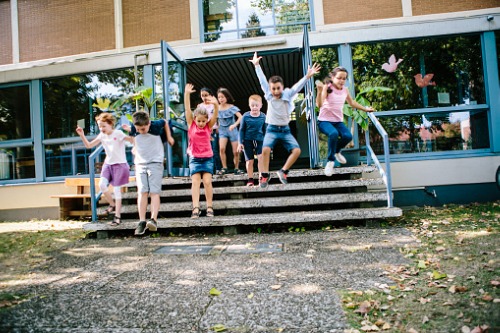
In his new book, titled ‘Let the Children Play’, Finnish educator, author and scholar, Pasi Sahlberg, argues that “more play will save our schools and help children thrive”.
“Educators and paediatricians both agree that play is important for children’s development and learning,” Sahlberg said in an interview with The Educator last year.
However, he pointed out that teaching and learning have been heading in the opposite direction: more pressure on effort and achievement for both teachers and students, longer school days and more homework.
To address this, experts have been pushing for physical activity to play a greater role in schooling, especially as concerns grow about students spending more and more time on their smartphones and other devices.
Following an alarming report of Australian students slowly shifting into a more sedentary lifestyle, educators are recognising the need to become more proactive about this issue.
Several experts have also touted physical activity as a way to improve student outcomes and even a potential solution to the so-called ‘student achievement crisis.’
While schools have a key role to play in keeping kids in shape – and some have already rolled out targeted programs to achieve this – some governments say much more needs to be done.
The Queensland Government, in partnership with Tennis Queensland, will be rolling out a new $1.5m school program – Tennis in State Schools initiative (TISSI), to help improve student health.
A well-supported move
The announcement, which follows the Australian Open, comes as the state tries to get more children to take up the sport. The program also has the support of Tennis Australia and the Department of Education.
“TISSI is about using tennis as a vehicle to support a healthy, active and vibrant school community,” Tennis Queensland chief executive Mark Handley said.
“We know improved facilities leads to more people wanting to play sport and that includes students, teachers, parents and carers”.
Queensland’s Education Minister Grace Grace said five state schools will benefit from the first round of the three-year program:
- Camp Hill State Infants and Primary School
- Mackay State High School
- Mossman State School
- Palm Beach-Currumbin State High School
- Wellers Hill State School
“This fantastic program will include new courts, improvements to existing courts, and repairs of existing tennis facilities,” Minister Grace said.
“These facilities will also be available for the wider community to use, with Tennis Queensland providing insurance cover for the facilities if the school is affiliated with it. We are working on the principle that if you provide the right facilities, young people will want to play tennis”.
Applications for the second round of TISSI are already open until the end of Term 1.
Making play accessible in Victoria
In December, Victoria announced efforts to make playgrounds more accessible through a $6m Inclusive Kindergartens Facilities Program.
The program provides up to $200,000 in facility upgrades to accommodate even children with disabilities and some 184 services are set to receive grants up to $10,000 which will be used to purchase adjustable tables and chairs, padded mats and weighted cushions.
Victoria is also the first state to roll out an ambitious plan to achieve 15 hours of funded three-year-old kindergarten programs by 2029.
The state government is set to spend more than $1.6bn in the next 10 years to build around 785 new kindergartens as well as expand 170 services.


